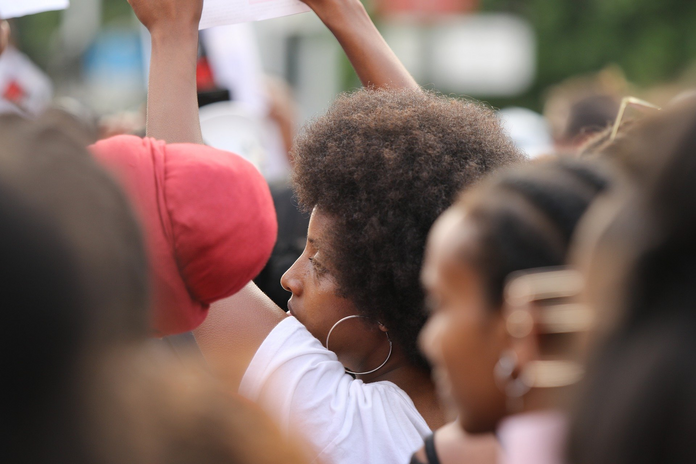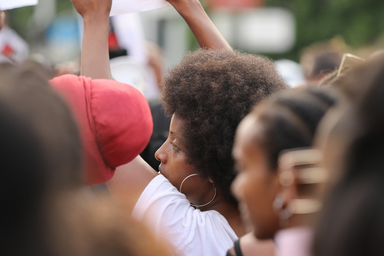This article is opinion-based and does not reflect the opinions of the University of Central Florida or Her Campus Media.
Some names have been altered at the request of the interviewees.
This month at UCF has been one for the books. It’s our first full month back to school amidst COVID-19 still raging in the United States, and tensions are at an all-time high. But, on a normal day, the campus is rather peaceful; eerily empty for the most part, and an ideal place to study. A Sunday morning kind-of-quiet rests between the buildings, interrupted only by the sprinkling of Orlando’s afternoon rain.
Until September 10, 2020. The rain came, as usual, but so did someone else.
On September 10, a little after 1 p.m., reports of sightings of Kaitlin Bennett, second amendment advocate and media personality, started rolling in on Twitter and Snapchat. Bennett was supposedly there to interview members of the student body, and she brought along her camera crew and microphone to document it. “I was there to make a YouTube video about, basically, a discussion [about] whether students think Joe Biden or Donald Trump would be best for Black America,” said Bennett herself in a Knight News interview with reporter Andrew Carson the following morning. In this same interview, Bennett claimed that if she were there to cause disputes, she would not have bothered trying to coordinate with the UCF Police Department beforehand.
Of course, nobody but Bennett herself will be able to fully confirm her intentions in coming to UCF that Thursday, and whether or not the size of the crowd was a wanted outcome. But, students absolutely have their own opinions.
Shelly, a currently remote UCF student, put it this way: “She purposefully came to a liberal university, which is an HSI and has Hispanic minorities making up the population, in a midst of a pandemic, initially without a mask, had bodyguards, and fueled anger during a time where Black Lives Matter is still fresh and tense.” Ironically, the following week of September 14-18 was Hispanic Serving Institution, or HSI, week, and banners had begun to go up around the Student Union that same day.
“I definitely think she came to antagonize certain groups of people. It is very well-known that this is what she does. Maybe she chose UCF because we have such a large minority population in both race and sexuality, gender identity — we’re pretty diverse in that way. She probably thought to herself, ‘this is a good place to come and start trouble,’ said Jane, a 22-year-old UCF student who witnessed the event when leaving work.
This is true. Bennett has made a name for herself in going to public university campuses and filming her interactions with students, causing something of a stir. “We asked her bodyguard if it is always like this when she’s on campus, does she really get people this wild? What we were told was it’s usually not as wild as it was at UCF, she usually doesn’t draw that big of a crowd. I kind of find that hard to believe, but he didn’t seem too annoyed, like it was something he was used to. He had probably seen something like this before,” Tom, a 19-year-old UCF student said of his brief interaction with her team.
Andy, another 19-year-old UCF student, had a similar impression of her intent behind her videography style. “I know a little history behind it. She goes to colleges and acts like an interviewer. She wants to start problems and get in the middle of a crowd.”
Bennett’s reputation precedes her. “I think she strives on problems,” said Christian, an 18-year-old Psychology student. “That’s what she wants because it gets her views. And I think she got that.”
So, why was she allowed on campus with such a history? According to Florida’s Campus Free Expression Act, “…members of the general public can come to campus without any prior notice to speak, carry signs, pass out leaflets, circulate petitions, record interactions in public areas of campus – and they can do so on any outdoor area of campus which is commonly open to members of the UCF community for use.” In simplest terms, it means she was allowed to be there, and there was nothing UCF could do about it, even if they wanted to.
Charlotte, a 21-year-old music student, had a direct response to these policies. “We acknowledge, even as part of the “angry bunch,” that under free speech, she had a right to be there and say what she wants to say, but we also acknowledge our right to criticize that.” All other interviewees, from all political standings, had similar responses. They knew she had a right to be there, whether or not they liked it, and they had a right to protest, whether or not they liked it.
The question isn’t really why Kaitlin was there, but why did UCF take so long to respond? According to a Tweet from Bennett herself, her team had alerted UCF of her plans. But, according to UCF, she came unannounced. “The UCF President also said he wasn’t aware of her presence on campus, but she claims she had met with UCF officials the day before letting them know where they were going to be, so somebody’s lying,” said 19-year-old student Jess.
Why wasn’t there an officer or faculty member nearby as soon as Bennett arrived to monitor the situation? Jess, who arrived before the crowd moved from the library but after police had gotten to the scene, immediately took action when given the chance. “The first thing I did was talk to an officer, I actually wrote down his badge number. All of the police officers except for one woman had their badge numbers covered. This officer did have his covered but was the only one to give it to me when I asked,” she said with distaste. We, at this time, don’t officially know why these specific UCFPD officers had their badge numbers covered.
When I asked Tom how many officers he saw throughout the incident, for which he was there for just about all of, he responded, “Not enough. I can probably count on one hand the number of UCFPD I saw there. I don’t know if there were any there in civilian clothing, or if they were just spread out or lost in the crowd. I think surrounding Kaitlin or in the area, I didn’t see more than four or five.” Across talking on record with eight people, the reported number of officers (in uniform) seen from beginning to end did not exceed 10.
And that is where this article is meant to be going. Where was UCF when we needed them most?
“I saw that a lot of the frustration [in the crowd] was with the UCF faculty and UCFPD because they were not seeming to be willing to enforce the mask policy. There were actually signs right behind Kaitlin [about UCF’s mask policy],” said Jess, who actually interacted with the Vice President of UCF outside the library. “The UCF Vice President did say that if the crowd didn’t back up, UCFPD would come into the crowd,” she said, explaining she felt “disheartened” by the whole ordeal.
Rachel, a 20-year-old student, had similar feelings. “We aren’t asking you to pick sides. We are asking you to protect us. That should have been the priority, regardless of how they felt about [Bennett]. It really didn’t feel that way for most of it.”
When asked about the threat of COVID-19, all interviewees unanimously stated that they didn’t feel threatened once everyone had a mask on. Most insinuated that they are healthy enough to have been in a position like that and will be able to monitor their symptoms.
That is not to say that gathering in that large of a crowd was right, nor was protesting wrong. It is a slippery slope, which is why UCF should have nipped it in the bud. “Knowing Kaitlin’s past behavior on other campuses and considering the huge crowd there was, UCF should have acted better. The second crowds started forming, they should have escorted her out,” Jane responded when asked about UCF’s response to the situation.
Could they have done that? According to the same document regarding Florida’s Campus Free Expression Act, “The University has rules related to use of campus that place reasonable restrictions on the time, place, and manner of use of outdoor areas of campus to prevent disruption to University operations and other events. Disruption includes hindering the flow of vehicular or pedestrian traffic; obstructing entrances and exits from buildings or parking structures/lots; violating any applicable law; threatening other individuals in a manner that an objectively reasonable person would interpret as a serious expression of an intent to cause a present or future harm to an identifiable person or group of persons (…).”
Technicalities fall on both sides. UCFPD technically had a right to escort Bennett off the campus, but Bennett could have taken legal action under the fact that she was one person and that the crowd was blocking the entrances. But, then again, the crowd wouldn’t have been there if Bennett wasn’t. “Everyone there had made it clear that we were there because we were unhappy with her presence on campus and the fact she wasn’t wearing a mask, and all agreed we would leave as soon as that was dealt with,” Jess answered when asked what her reasoning was for sticking around.
“We had to be there. We had to see, we had to yell, even if it didn’t get her off campus, it would just make us feel better, like we were protecting our community,” said Charlotte when asked a similar question. Once again, a slippery slope. There are expressions of free speech on both ends and violations of COVID-19 policies on both ends. Where is the line drawn?
It was, admittedly, an unsafe practice on behalf of the crowd to gather in such numbers in such close proximity, but UCF didn’t do much to stop it, so why would they? What UCF could have done from minute one was enforce every kind of COVID-19 policy they have, both with Bennett and the crowd. “You must wear a facial covering, and maintain 6 feet or greater physical distancing,” says UCF’s own website under the “visitor” section of COVID-19 policies. In the student section, the website states to “Keep at least 6 feet distance between yourself and others, and wear a face covering in common areas.” Jess, upon being asked about it, was told the UCFPD cannot enforce these policies.
But, the administration could have, and both the Vice President, as previously mentioned, and the President himself were spotted near the scene on Thursday. Why wasn’t immediate action taken to disperse the crowd, even if that action had to be escorting Bennett off of campus? Tom continued his response to the question on UCFPD’s presence. “I would’ve liked to have seen more faculty out there, more representatives from UCF themselves, because I think the students would have responded better to that. I think law enforcement was too afraid to do much at all to anyone, force anyone away or anything.”
In times like these, safety is of utmost priority. While most reports say that everyone in the crowd was wearing a mask, UCF should not have let this go on long enough to draw that big of a crowd. And, when it comes down to it, UCF should have been there for its students. Andy, who sat down for an interview with Kara, another 19-year-old UCF student who witnessed the event alongside him, had the following exchange: “It felt like they were only trying to protect them, it definitely felt like they were standing their ground against us. If anything, I know we have freedom of speech, but I heard that is the case until it imposes on business and stuff, so why didn’t the cops remove her?”
Kara then said, “You could tell that tension was rising very quickly, and it really just had to do with her being there. She didn’t even know the campus itself, so she was just walking in circles around the union drawing a huge crowd.”
Lana, another UCF student who agreed to talk about her experience, said, “Whether it’s a fine or something else, this is not something that can be talked down because of political differences. It is a health issue and at the end of the day, politics should not be involved and everyone should abide by the CDC guidelines.”
The disappointment in UCF’s response, unfortunately, did not stop there. Later that day, UCF released a statement in regards to the event, which can be found here. When asked about their response to the statement, interviewees on all sides of the political spectrum had a similar answer: it wasn’t enough. “UCF’s statement was weak and ineffectual, and it was simply too little, too late. They need to put their money where their mouth is and actually do better next time for me to believe that they want to do better,” said Nicholas, a 19-year-old Political Science student.

UCF needs to do better in protecting its students, both in the physical sense and ideological sense. When asked about being worried about similar incidents in the future, Jess responded, “I am very proud to be a UCF student, I am proud of the fact that we, as students, made it clear that we did not want bigoted people on our campus. I don’t know about other people coming to campus, but this does, and very much should, bring up some concerns for the university if a similar figure comes next semester. I do foresee a very similar thing happening, and I expect it to be larger, because the date and location will be set in advance, and there was already a lot of controversy around [them] coming.”
UCF students made headlines this month. Regardless of political ideology, one cannot deny that this was a perfect storm of right and wrong on all ends that resulted in chaos. It could have, and should have, been handled differently, especially if the claims that UCF and UCFPD were alerted ahead of time are true. “I am not siding with anyone, Kaitlin, or the police. When it comes to the institution, it felt very out of the blue,” said Kara in closing. “UCF is a very loving community and is incredibly diverse, any views actually are accepted and represented here. Just don’t come at us like that.”
The University of Central Florida is huge, meaning we have a lot of students with all kinds of backgrounds and beliefs. Unfortunately, the incident has caused sizable rifts in our community between those who agree with Bennett and those who don’t, in a time where comradery is so important to the health and safety of our community. Moving forward, UCF, its students, and its visitors all need to work together to start conversations in a healthy way and prioritize safety over proving a point — even if it means having harder conversations and taking bigger precautions. UCF students want to be heard and don’t want similar incidents happening again. And, if it does, we want to be assured that UCF is on the side of its students, with their best interests in mind.




